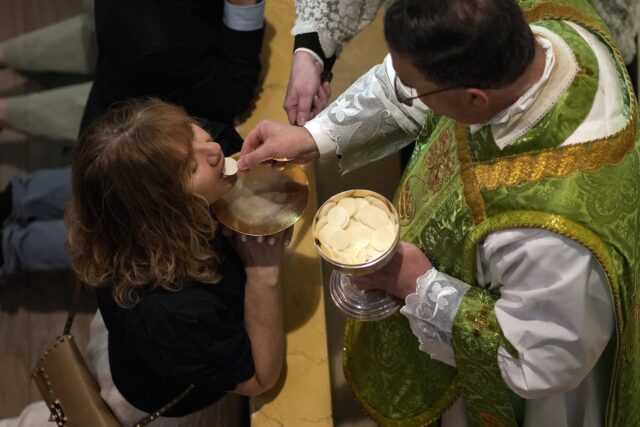
By Cecilia Cicone, OSV News
The first time I was in an in-patient locked psychiatric unit, I was overwhelmed by the amount of suffering I saw in the people there.
While conversations about mental health are fairly common, the experience and suffering of serious mental illness — of psychosis, detachment from reality and life-threatening impulsivity — were completely new for me. My heart was filled with compassion and pity for the men and women on the unit for whom every single day was a fight to stay alive.
But I wasn’t on the unit as a health care provider or minister. I was there because I, too, was suffering more than I ever thought possible.
My mental health symptoms have led to diagnoses of post-traumatic stress disorder (PTSD) and dissociative identity disorder (DID), which was formerly known as multiple personality disorder. Since that first time when I was hospitalized, I have been in treatment and hospitalized three more times. I take medication and I have been in therapy for years, both with varying degrees of success.
I try to remain rooted in my identity as a beloved daughter of God, but my symptoms impact nearly every aspect of my life. One of the most painful aspects of my mental illness — and this is true for many Catholics I’ve met who experience similar symptoms — is the impact it has on the ability to practice our faith.
When I first started experiencing symptoms of mental illness, I was in formation to become a religious sister, praying literally hours a day, participating in daily Mass, praying the Liturgy of the Hours and making a daily holy hour. Now, I can barely close my eyes long enough to pray a prayer before meals before my nervous system kicks into overdrive, sensing danger and pushing my brain and body into a flashback.
[In the hopes of saving more lives, experts shared their advice on suicide prevention]
Many well-meaning people have recommended spiritual practices to me, picking up on the fact that mental illness can easily disrupt someone’s spiritual life. Regular confession and Communion, praying the Rosary or St. Michael Prayer, novenas to Sts. Dymphna and Jude and regularly using holy water are all beautiful expressions of trust in God’s goodness and the reality that all the saints in heaven intercede for our good. But spiritual practices alone cannot heal mental illness. Only God can do that, and only if he wills it.
One of the greatest gifts Catholicism has to offer those of us who experience mental illness is not chaplets or devotions, but a framework for understanding our pain and suffering, and the strong conviction that it will not be in vain. This belief, when taken to heart, can literally be lifesaving.
Suffering has purpose within the Catholic worldview. Jesus is especially close to those who suffer because we are participating in the very same experience that won our salvation. When we suffer, we have an opportunity to be co-redeemers with Christ, rising above the
despair the Evil One wants for us, and trusting completely in the Father even when it seems we have no reason to trust.
This kind of belief is only accessible to a rational mind grounded in faith, though. Rationality and logic are often not accessible to people who experience mental illness. That’s where another gift of the Catholic worldview comes into play in a lifesaving way: communion.
People who love someone who is mentally ill also suffer from the effects of their mental illness. It can be confusing and excruciating to love someone who experiences such existential pain and who may engage in self-destructive behaviors, unsure how to ease their suffering or even to keep them safe.
In the church, we do not live or die on our individual faith alone. We are united with one another, in Christ, and we can cling to one another’s faith in the darkest of moments when our own faith fails.
In practice, this means being able to sit with those who experience mental illness even in the unbelievable darkness and irrationality that they may experience without attempting to fix it.
Mental illness can be extremely isolating, and the lies that accompany mental illness can quite literally kill those whose minds betray them. Someone who is grounded in reality and God’s love can be a life-saver. Sitting with someone in their pain without looking away or dismissing it, even when it doesn’t make sense or is frightening, and presenting that suffering to God as an offering takes what seeks to kill and makes it life-giving.
Someone suffering from mental illness may not be able to find meaning in their suffering by offering it along with Christ’s sacrifice at the Mass or through prayer and fasting. But if you love someone who is experiencing mental illness, you can pray and suffer on their behalf, accompanying them through the dark valleys to the light, even if they cannot fully experience that light on this side of heaven.
If you or someone you love is experiencing mental illness, there is hope. Cling to Jesus and the sacraments, find consolation in the Blessed Mother and the saints, pray for one another, and remain grounded in the knowledge that God will not allow suffering to be in vain. He will work through our wounds, which will be the very places he fills with grace to save us.
One closing word: If you or someone you love is unsafe due to mental illness, please do not hesitate to reach out for help. Contact emergency or professional services to maintain safety, such as the nearest emergency room or call or text 988 for the national suicide and crisis hotline.
Cecilia Cicone is an author and communicator who works in diocesan ministry in Northwest Indiana.










